- Home
- Maine Coon Kittens
- Introducing a New Kitten
Tips For Introducing a New Kitten
To Your Other Pets and Home
Time for the big day! Here are some tips for introducing a new kitten. With a little preparation, the introduction process should be smooth sailing.
Meeting the Family for the First Time!
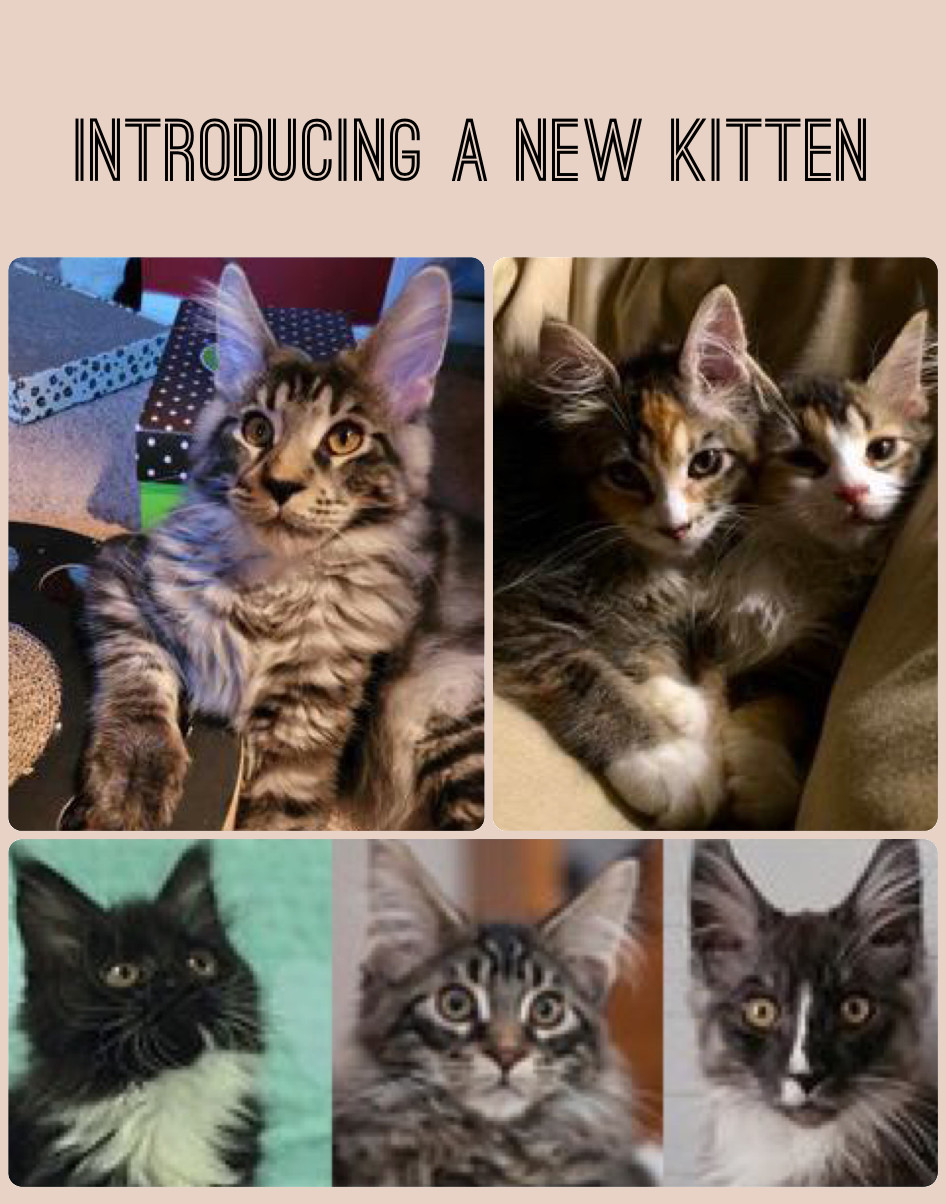
Try introducing a new kitten when you have some time on your hands. It's important to be home in case you're needed.
Weekends and holidays are the best times for bringing a new kitten home, if you usually work away from home on weekdays. Mornings are good, for the same reason.
Have the home quiet. He may be scared, and will be cautious at first. Give him some space from loud noise, music, media or young children, and no other pets should be introduced for a while.
The kitten may want to hide at first. He will soon build confidence, and explore these new surroundings when he's ready.
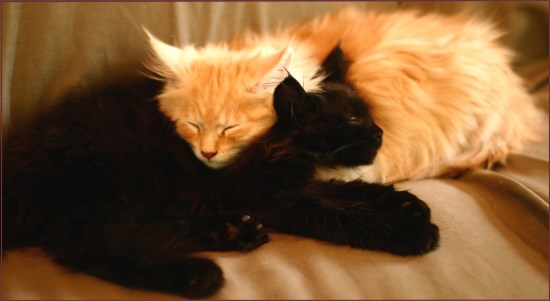
Taking things slowly in the first week will give you the best chance for a successful introduction. The good news is that young kittens are very adaptable and usually acclimate to their new home easily!
Positive associations: If you've been visiting your kitten at the cattery, maybe you've left a towel or blanket behind on one of those visits. Now, you can put it into his bed. As he settles into his new home he has those familiar smells for comfort.
You will want to set up a separate room, or safe room, for your new kitten(s).
A spare bedroom works great for this first couple of days. It's a good idea to also add a baby gate on one side of the door to ensure no early face-to-face meetings. Cats and kittens are sneaky!
We set up our kittens in the laundry room on the first day. It's a small room, but it was the only room that could be totally theirs.
They crept out of the cat carrier cautiously. I didn't do any laundry for a while! Once they were super comfortable with that room, they bravely ventured further into this new environment each time, on their own terms.
 Alice and Leo in the laundry room on their first day
Alice and Leo in the laundry room on their first day
Introducing a New Kitten To Dogs
Do you have a dog? Introducing a new kitten to a dog can be much easier than you might imagine.
Mature, calm dogs generally don't have much interest in kittens. And little kittens have no fear! They will happily chase the tail of, and snuggle with a nice dog.
When I was young, I had a Sheltie named Bonny. She was in her prime, meaning very active! She ran a lot.
We added an awesome red tabby kitten to the family. Boy, they chased each other all over the house, day and night. I had to name him Clyde! They remained best buddies and very bonded for their whole lifetimes.
As much as we hope they will become best friends, not all dogs are the same. Only you know your pet!
My next Sheltie was a chaser, but not in a chase-and-be-chased fun game kind of way. She was just a chaser. Our Coonies didn't like it!
If your dog is well-meaning but young and rough, you'll need to supervise until the kitten is older and sturdier. Along with discouraging any aggressive behavior, also discourage any signs of aggression and any chasing at this time.
It will quickly establish a dynamic where your cat will run and hide from your dog permanently. It's fun for the dog, but a stressful and unhappy situation for the cat.
If you suspect your dog would not be compatible with a kitten, you're probably right. Consider carefully, before taking the plunge into bringing home a new kitten.
Introducing A New Kitten To Other Cats
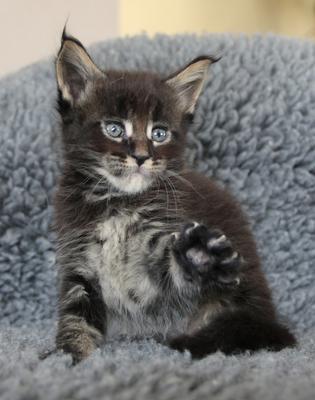
As with dogs, this is partly dependent on the personality of your older cat. In most cases, you can expect your cat and kitten to develop mutual respect and hopefully, even friendship.
Maine Coons are particularly laid back and non-territorial, and generally see no threat from cute fuzzy kittens. They seem to know their own kind!
Still, introducing a new kitten to a resident cat should be handled with care.
Obviously, you can't prepare your adult cat for the new arrival. It's very helpful to keep them in separate spaces at first. Try to have your older cat confined to a closed room when you enter the house. Then place your kitten in his confined place, with his own food and water bowls, litter box and scratching post if desired.
Lastly, let your current cat loose and watch her behavior. She will probably pick up the new scent and know exactly where the kitten is. If she sits by the door curiously, great!
If she sticks her paw under to play with the kitten, lucky you! This is a great time to break out the treats.
If your first cat shows signs of stress, that's ok too. Just give her time and lots of positive reinforcement. If there ever was a time to spoil your older cat with treats and attention, this is it!
Once you are sure your first cat is not stressed about the situation (and this could take a while!) it's time to let them see each other.
Hold the kitten up and let the your cat see him. Use your judgment to decide if the cat can come and sniff the kitten. Take it from there!
It all comes down to utilizing separate locations, reading your older cat's reactions, understanding if she's stressed, and generally being in tune with her.
Use Positive Experiences: In cat introductions, it is very helpful for your existing cat to associate the kitten with good things.
After initial introductions, but before they are actually together, try feeding them on each side of the pet gate or screen door where they can see each other with visual contact.
Move the food bowls closer to the gate and each other over time.
How Long Does it Take a Cat to Get Used to a New Kitten?
The amount of time can vary from virtually immediate friendship to a couple of weeks, to months or even years.
But the good news is that adult cats tend to be more accepting of new kittens than of another full grown cat. Some folks say it helps to get a kitten of the opposite gender.
You could also consider using your sanctuary room fostering cats or kittens. This is a great way to help out, and also to see how your established cat behaves.
Bringing Home a New Kitten:

During your first days with your kitten, you may notice he has a case of the sniffles. This can happen, due to stress. Just wipe his eyes or nose, and it'll clear up.
Also, some new owners notice diarrhea in kittens. Don't be alarmed! Diarrhea in kittens can happen.
Contact your vet, you may be able to take care of it with an over-the-counter drugstore remedy, if recommended.
When bringing home a new kitten, fleas may come with her. This is not uncommon, it happens to the best of breeders.
This is because flea medication can't be given to nursing cats or newborn kittens, up to a certain weight. If you've brought home kittens with fleas, call the vet.
Some good flea medication will take care of it quickly. This is another good reason for your kitten to have her own room for a while.
Many cats don't like sharing a litter tray. To help keep your first cat happy, have at least one litter box per feline, plus one extra in the home.
Kittens climb on everything! They chew anything and everything, too. Make sure to utilize their safe space, which is free of hazards (such as electrical cords), whenever you are away from the home or asleep.
Brining home a new pet is one of the most exciting times. Introducing a new kitten can be easy! Make sure to lavish plenty of attention and tasty treats on your older pets, too. Hopefully they will soon be good friends.
Enjoy this special time with your kitten and remember to take lots of pictures!
From our community:
Introducing A Kitten
by: Rachel
(New Zealand)
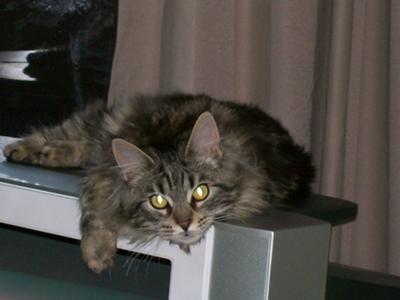
Hi there, I have a 3yr old female Maine Coon (Marmite) and am about to get a 13 week old Male silver Maine coon kitten from the same breeder -
I'm not sure how she's going to take to him (having never had to share her territory) -
Any tips on how best to introduce them?
Thanks.
Rachel :-)
Reply:
Hi Rachel,
Congratulations on your new little guy, you must be very excited!
We have a whole page about Introducing A New Kitten, & I can't think of much more to add.
Marmite looks like a great girl, with plenty of play left in her. I'm sure she'll do fine!
Let's see if other visitors have some tips and personal experiences to share, too!
All The Best,
~Carrie
Comments:
The way we do it...
by: Kim Sweet
Hello, and CONGRATS to the new family member. We now have 4 cats and this is how we have introduced each to each other.
When we have first brought the new family member home we have taken the new member to our room, you can sue any room in the house, and let them get use to our room and the smells of the different family members that way first.
Then after a couple of hours we open the door to one other family member at a time for a few minutes. About a day later we open the door to all freely to come and go as they please. We make sure that all our family members new and ... established get lots of attention.
The attention given is very important, don't let any of them feel less important or less loved than any other. I really feel that is the key to a happy multiple critter family home. When one of our family members have hissed or gotten out of line we have let them know we were not happy with their actions, given the one that got hissed ect at some love'ns to let them know its OK and then given the one that did wrong some attention too, Maybe not as much as normal but some to let them know we do love them too even though what they did was wrong.
Hope this helps... Good luck :)
The Gang
by: Juliet
Very exciting getting your 2nd Maine Coon - what will you call him?
I have 4 cats 2 Maine Coons and 2 non-pedigree. The MC's were introduced one year apart. I left the new arrivals in the carry box for 1/2 hour let the others sniff about then opened the door. Luckily for me they are ALL very easy going little things, there was the odd hiss and paw swipe but now they have all found their own pecking order. I put their feed bowls in a row from the start too..I found when it was breakfast time they were too excited about eating rather than see who was stood next to them :) Either I was very lucky or I have 4 very laid back dudes :) And it is true what they say isn't it one Maine Coon isn't enough x
Very Similar...
by: Kim Sweet
Yes that sounds very similar to how we have introduced our gang to each other. Right down to where we have placed their bowls... Now our Makani and Ivan (Maine Coon and MC mix)are inseparable. Autumn and Pewter, our two girls keep to themselves but they all get along even though we just adopted Pewter less than a month ago. Like I said I am a big believer in give'n the love'ns and attention to all the same. Give each their own time and then time with others as well...
It has worked for us I hope you find a way that works for you also.
Thanks
by: Rachel
Thanks for the advice guys - will certainly try a combination of those tips and let you know how it goes - am SUPER excited to get my 2nd Maine Coon - it definately is true that one isn't enough! :-)Will post a pic of the new guy when he arrives! x
Getting Another Maine Coon?
by: Peter
(Australia)
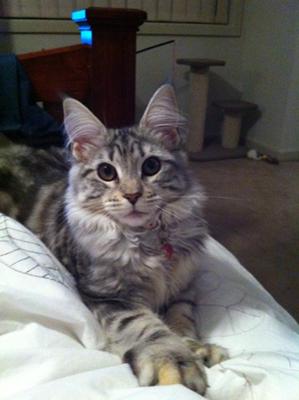
We have a 9 month old cat Phoebe, who is a gorgeous girl that is some what independant however she likes to be in our presence when we are at home. We work full time and worry that she is lonely during the day. Is there away to tell if a cat is lonely during that day?
We are thinking of getting a male kitten, is there a certain personality type that we should look for to match Phoebe? Any advice would be appreciated.
Thank You!
Reply:
Hi Peter,
Phoebe is so beautiful! As for your question, it's hard to say how she feels about being home alone. The only way to know for sure is to use a video camera!
Most cats are fine with it, and you mention that Phoebe is somewhat independent. But, Maine Coons are very social animals. Most owners find that when they add a second (or more), they cats develop a wonderful bond.
It's not as much a question of should you get another, as do you want to? If so, go for it! If she's home alone much of the day, she would surely enjoy a buddy. A boy or girl would be just fine.
As for personality type, it's hard to find a particular type with kittens. They are all pretty "moldable." Keep in mind that one will end up in the Alpha position. Usually, it's the boy. If you think Phoebe would want to be the boss, (or maybe the more submissive one) let your breeder know, and they will be more than happy to work with you on finding a personality match.
Thanks for sharing your girl with us!
All The Best,
~Carrie
Comments:
'Do it!'
by: Rachel
I also have a 3yr old Female Maine Coon (Marmite) and really wanted another one so brought 'Dave' into the family (a Silver Male Maine Coon kitten).
To my horror she appeared to hate him at first, and hissed and growled anytime he was near - most upsetting!! I never expected this as she was always so 'laid-back' but i guess the interruption to her 'territory' was too much! I have to say though, with perseverance and time they are now great friends and sleep and play together so although it was initially hard work, it is so rewarding now!
They were from the same breeder (3 yrs apart) but have the most distinctly different personalities! Marmite is very independant, and likes to be near you, but isn't one for much of a fuss - unless she chooses it! Dave is adorable - so cuddly and smoochy and a total lap cat at times, while also being independant too. They both have different funny 'quirks' which make them highly entertaining and i wouldn't be without either of them now. So I say 'go for it!'
It may not be all 'plain sailing' at first, but in time it will be the best decision you made! :-)
Another Cat?
by: Helen
I have had cats for more than 40 years, sometimes I worked, sometimes I didn't. There were times I only had a single housecat, at other times I had up to six.
Remember, cats live with you, not the other way round. They sleep up to 20 hours out of 24.
My personal advice is for you to enjoy Phoebe by herself for another year or two. She will bond more closely to you. You can always introduce a kitten later. She will have a "hissy" fit, but will get over it in a couple of weeks.
My big red male has a very distinct muzzle and big square whisker pads like your Phoebe. I love the look. She is so alert and "full of it." You've got a lovely kitten.
Another cat
by: Babbs
If you would like another cat I would do it soon before yours gets too territorial. I tried to introduce another to our Maine Coon and he just wouldn't adjust. He is fine with dogs, but not another cat. The only mistake I feel that I made when I bought Rio is that I didn't get two at the same time.
Barbara in Maine, USA
Where should a new kitten to the home sleep??
We are purchasing a kitten approx. 12 weeks old and want to know where he should sleep at night? We all sleep on the 2nd floor and so should there be an extra litter box upstairs too?
Reply:
Hi,
That's a good question. I think many people have their own way of doing it, and it depends on a couple of factors.
Do you have a large house, or a small apartment? If you live in a small home your new kitten would do fine right in the main living area, providing there aren't other pets or children around. But I do feel that a new little kitten would be more secure in a particular room with the door shut at first.
Speaking of pets or children, if they are home too you will definitely want to keep the kitten separate for the first few days.
Our page on introducing a new kitten has suggestions for acclimating a kitten to the home.
Whether you decide to do this in your own bedroom or another room is entirely up to you! It mainly depends on if you plan to let your cat have free reign of the home and come pounce on you at all hours when he's grown. Whatever you do now will set the stage for later.
Lots of people are okay with that, and find it sweet or bonding. If that sounds like you, then set up your kitten in your bedroom from day one.
Yes, you'll want a litter box and food/water dishes right in the room (just for a little while.)
As soon as he/she is accustomed to the house you can move the litter box to a more appropriate place. It may only be a day or two.
In our case, with young children and other pets, I knew our sleep was much too precious to lose.
So I knew we wouldn't be 'co-sleeping' (although we do on special occasions and some weekends) so we set up the kittens in the laundry room with all their stuff.
We let them explore the room and get comfortable. I closed the door and visited them a lot in that room that first day. It really helped that we didn't overwhelm them with the whole house.
That first night, we picked them up and cuddled them on the couch during our evening shows. They purred and they were so sweet! Then off to bed in their 'room.'
After a few days they were bombing around the house like a couple of ruffians. And after a couple of weeks we introduced them to the daylight basement, then moved their stuff down there for nights.
We tried leaving them around the house when we were sleeping or gone, but they were so destructive! There was no shelf, at any height, that they didn't clean off at some point!
I would say you definitely should have a litter box on each floor. When your kitten is grown you can have just one, but for now it's better safe than sorry.
The bathroom works well. Just make sure the door is left open whenever the room is not being used.
I wouldn't use the bathroom for kitten's room, though. Showers and faucets and people barging in would be scary.
One last thing we learned the hard way: Every member of the house must make a habit to keep the toilet lids closed at all times! :-)
Enjoy your new little one,
~Carrie
Top of Introducing a New Kitten
Recent Articles
-
Today's Features
Apr 16, 25 09:54 PM
Today we have two classic Memory Lane pages to share!
Murphy & Candy Cane: Double the Maine Coon Charm - This adorable Maine Coon duo from our 2011 Photo Albums - Murphy and Candy Cane - brought doubl… -
Memory Lane Month Begins!
Apr 15, 25 10:22 PM
We're thrilled to start our "Memory Lane Month" event by visiting some cherished moments from our community! We're in the process of restoring meaningful community stories like this one, to preserve t… -
Will a Maine Coon Protect Its Owner From Danger or an Intruder?
Apr 09, 25 10:41 PM
Plenty of people are curious: Will a Maine Coon protect its owner if something happens? Let’s talk about what this means, and what kind of protector a Coonie is.



